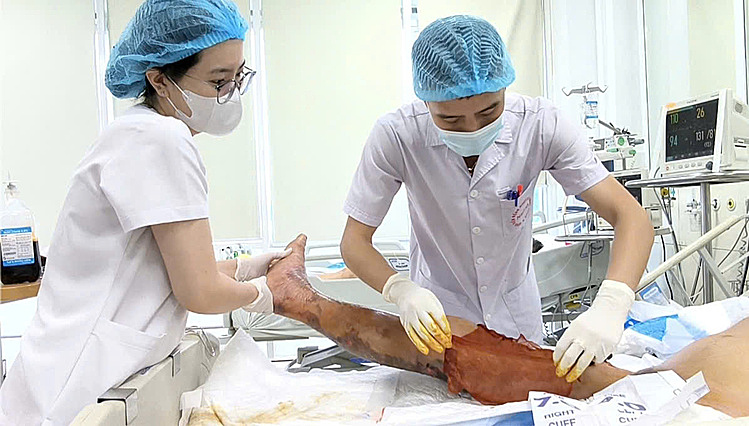On 4/9, the National Hospital for Tropical Diseases reported a patient admitted with severe swelling, blackened skin, and large blisters on his thigh. A previous hospital diagnosed him with cellulitis, septic shock, and severe infection.
Doctors at the National Hospital for Tropical Diseases diagnosed the man with necrotizing fasciitis (flesh-eating disease), an extremely dangerous bacterial infection. Bacteria can enter through open wounds, releasing toxins that destroy skin, underlying tissue, and muscle. This can lead to sepsis, shock, multiple organ failure, and a high mortality rate. The medical team administered high-dose antibiotics, vasopressors, continuous blood filtration, and mechanical ventilation.
Doctor Mac Duy Hung of the Intensive Care Unit explained that the patient's pre-existing, untreated gout weakened his immune system. This allowed a minor skin injury, left uncleaned, to cause widespread infection, leading to a critical condition. Fortunately, after intensive care, the patient recovered, was weaned off the ventilator, and the infected area on his thigh was cleaned. The tissues began to regain their healthy color.
 |
Doctors examine the patient. Photo: Hospital provided |
Doctors examine the patient. Photo: Hospital provided
According to doctors, people with weakened immune systems, such as the elderly, those with diabetes, cirrhosis, alcohol addiction, or those on long-term corticosteroid treatment, are more susceptible to bacterial infections. When working in unsanitary environments, they should use protective gear to avoid scratches. Any wounds should be immediately disinfected, and medical attention should be sought if any unusual signs appear. This is especially important for farmers and laborers working in fields or construction sites where contact with soil, waste, and sharp objects is common.
Doctors recommend that workers wear gloves, boots, and protective clothing. Even small wounds should be cleaned, disinfected, and monitored closely.
Thuy Quynh












